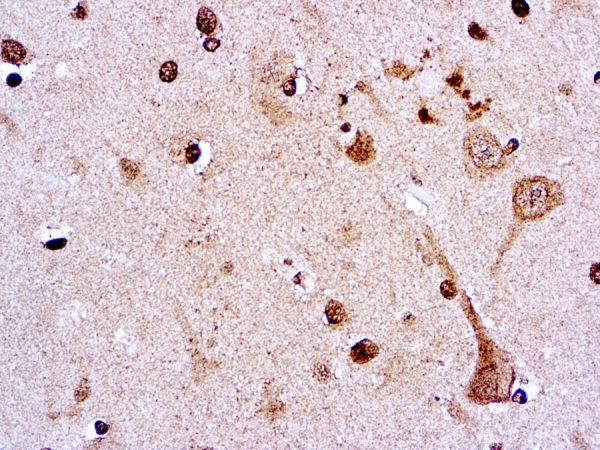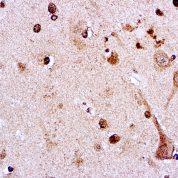Antibody (Suitable for clinical applications)
Sample Type: FFPE Patient Samples.
Tested Applications: IHC. Approved for In Vitro Diagnostic Procedures on FFPE tissues. For tissue collection recommendations, please see datasheet sent with product.
Application Notes
| Specification | Recommendation |
|---|---|
| Recommended Dilution (Conc) | 1:50-1:100 |
| Pretreatment | Citrate Buffer pH 6.0 |
| Incubation Parameters | 30 min at Room Temperature |
Prior to use, inspect vial for the presence of any precipitate or other unusual physical properties. These can indicate that the antibody has degraded and is no longer suitable for patient samples. Please run positive and negative controls simultaneously with all patient samples to account and control for errors in laboratory procedure. Use of methods or materials not recommended by enQuire Bio including change to dilution range and detection system should be routinely validated by the user.
Clonality: Polyclonal
Anti-Amyloid Precursor Protein Antibody Clone: Polyclonal
Host and Isotype: Rabbit Undetermined
Recommended Positive Control Sample: Brain
Cellular Localization of Antibody Polyclonal Staining: Cytoplasmic, extracellular
Buffer and Stabilizer: PBS with 1% BSA and 0.05% NaN3
Antibody Concentration: Lot specific. Plese contact tech support for data.
Immunogen: A synthetic peptide corresponding to C-terminal of human APP.
Storage Conditions: This antibody should be stored refrigerated (2-8°C). This product should not be used past the expiration date printed on the vial.
Amyloid Precursor Protein Information for Pathologists
Summary:
Amyloid beta (A4) precursor protein (APP) is part of the type 1 transmembrane protein family. The APP gene is located on chromosome 21 and encodes for a cell surface receptor and transmembrane precursor protein. There are three homologs of APP: APP, APLP1 and APLP2 (Mol Neurodegener 2011;6:27). Cleavage of APP sequentially by beta secretase (rate limiting step) and gamma secretase produces beta amyloid (amyloid beta, A4, Abeta) peptides of 40 - 43 amino acids, as well as other peptides that have transcriptional, antimicrobial, or antifungal activities (Curr Opin Neurol 2000;13:377). The beta amyloid sequence is unique to APP and is not present in APLP1 or APLP2.Limitations and Warranty
This antibody is manufactured in accordance with clinical good manufacturing practices in an ISO13485:2016 certified production facility. It is intended for multiple uses including in vitro diagnostic use and research use only applications. Please see vial label for expiration date. We strive to always deliver antibodies with a shelf life of at least two years.






There are no reviews yet.